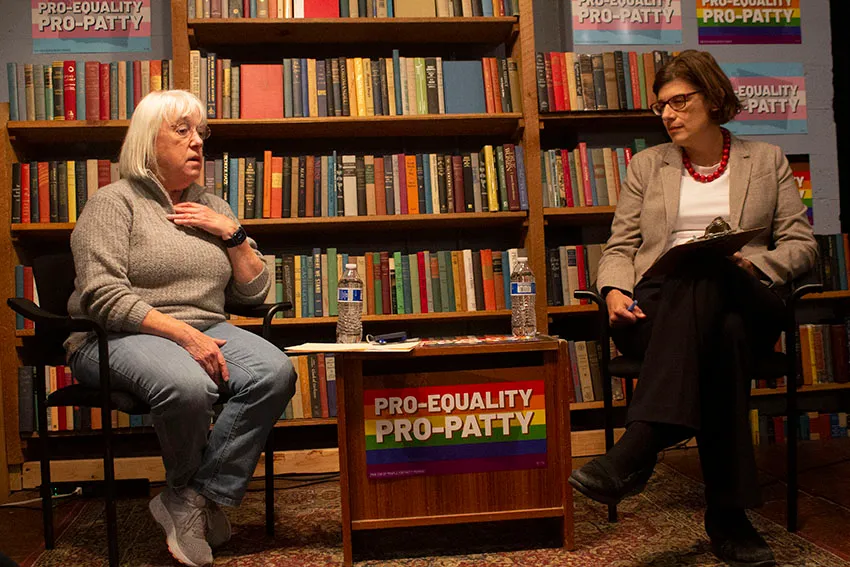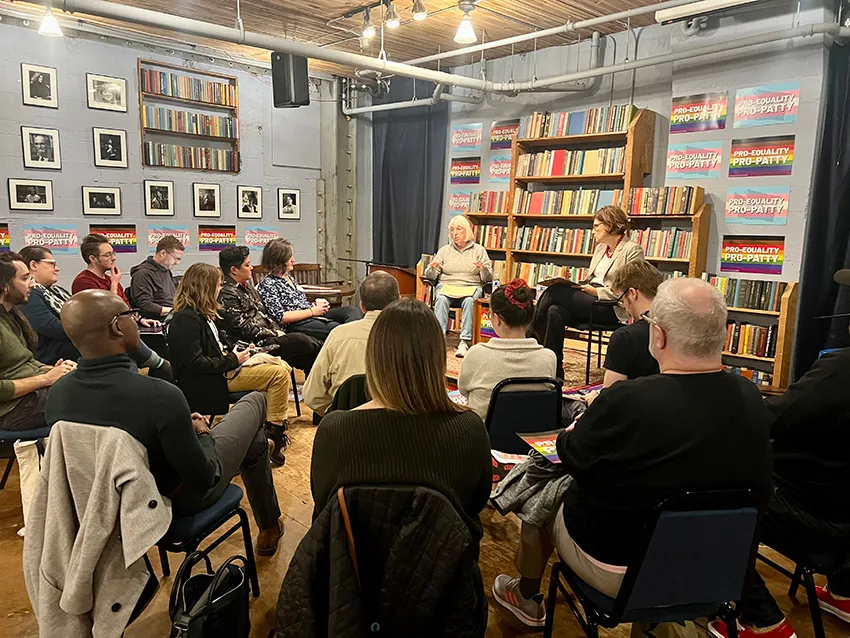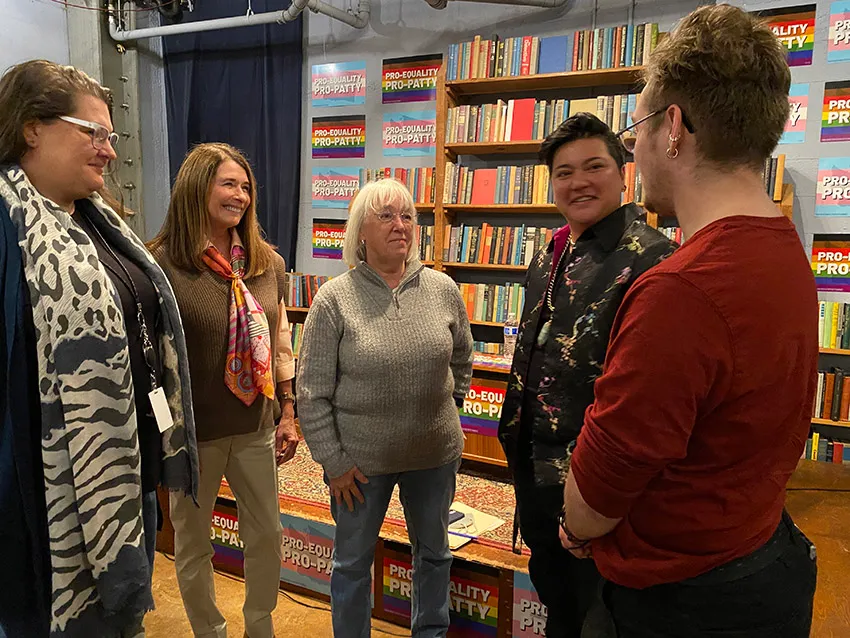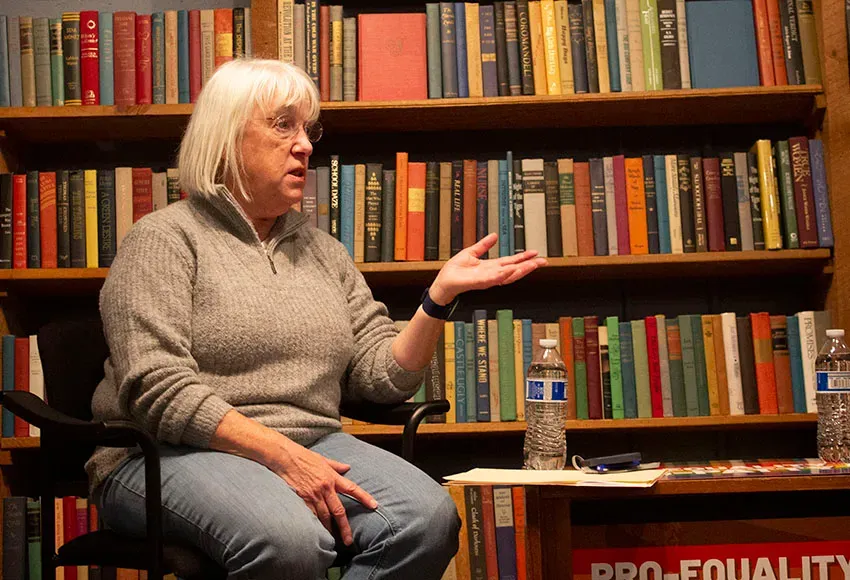Surely, everyone has seen the election ads bombarding Washingtonians' airwaves. While it may be surprising that candidates on both sides are spending so much money on the state's senatorial election, incumbent candidate Patty Murray believes this year's race is the most important one of her life.
"I keep saying this is the most important election of my lifetime. I think I say that every time, but now, this is. This is it," Murray said in a roundtable for Seattle's LGBTQ+ community on Thursday, October 27. "Women's rights are on the line. LGBTQ+ rights are on the line. Our democracy is on the line. Where our country is going to go is on the line, and it comes right here through Washington state."

An ally to an LGBTQ community at risk
Aside from the obvious concerns that a Republican senator from Washington would mean the Republican Party would take control of the Senate and put Mitch McConnell back into power, Murray believes that if her opponent is elected, the LGBTQ+ community will face serious risks.
"We are really at a critical juncture for the LGBTQ community, and I just think it is so important that we have someone in the United States Senate who will stand up and speak out for you, and who will vote right for legislation like the Equality Act or the Same-Sex Marriage Act," she said.
"When I saw my opponent on Sunday, she didn't even know how to talk about same-sex marriage and was yelling at everyone that we need religious exemptions. I don't know what that means. Nobody is requiring you to get married."
Not only does Murray worry that a Republican majority in the Senate will make it much harder for Democrats to pass laws codifying same-sex marriage, but she also is concerned about the introduction of federal legislation that mimics Florida's controversial "Don't Say Gay" law. On Tuesday, October 18, Rep. Mike Johnson introduced a bill in Congress that, if passed, will halt federal funding to public schools that allow conversations, literature, and sex education that involves LGBTQ+ people.
Murray has built her 30-year Senate career around standing up against Republicans like Johnson and has made a name for herself as an ally to the LGBTQ+ community. After 30 years, she has grown increasingly tired of the same intolerance she's encountered throughout. "Seriously, I work in the United States Senate, and I hear the comments from people who are supposed to be elected representatives, and I am just appalled at where we are – banning books?
"To make this especially hard on our kids today, to me, as a parent and a former teacher, is so wrong. I will tell you, and my fellow senators will tell you, I'm the first one out on the floor yelling at people if they start talking about Trans kids."
A history of protecting the Trans community
Murray works tirelessly in the Senate as an advocate of Trans people and their families. "I remember one night we had an all-night session where they were offering amendments every few minutes, and we had one minute to respond, and I had finally taken a break because I chair the Health, Education, and Labor Committee, so I was constantly having to do the rebuttal, but I went back to my office just to take a break.
"My staff called, and she said, 'You gotta get back out there. They're offering an amendment against Trans kids,' and I went back out there – and I never do this on the floor, but I said, 'For the love of God' – that's literally what I said – 'What are you doing? We're here talking about this other issue, and you have to insert this? And put kids down? Kids, who already have challenges, and making them feel worse by the United States Senate making some kind of statement?' I usually get to the facts, but I was just angry."
It's Murray's unabashed support of Queer and Trans youth that she believes may be the reason behind Republicans targeting her seat. While Washington doesn't often have very close elections, major superPACs and Trump-based support groups have poured money into the campaign of Murray's opponent, Tiffany Smiley.
"I know, everyone's turning off the ads. She raised $6 million in the last quarter. It is funneled here through the Trump campaign. Folks like the Graham family, and Betsy DeVos family, have contributed to that. So, if you just look at that, you know where it's coming from. And Mitch McConnell just gave a million and a quarter for the next ten days. Please don't watch TV at all: it's going to be ugly. They are just throwing money at my poor little state! But they want the majority," she said.

Smiley comes for Capitol Hill; Murray defends unions
One of Smiley's tactics has been to condemn Seattle neighborhoods as dangerous and crime-ridden. One of her most popular ads shows Smiley in front of the Capitol Hill Starbucks, which closed down earlier this year.
While Smiley has been vocal in her disapproval of Seattle, Murray has a different outlook on the community.
"I have communities all over the state, including many in Seattle, who are struggling right now. With crime. With inflation. With people not wanting to come because of COVID. All of this is real, but I don't go to communities and take a picture and put it on an ad on the TV to denigrate that community," she said.
"I go to that community and talk to community leaders and say, 'What can I do as a US senator to help you with homelessness, with crime, with inflation, with making sure people get what they need, like vaccines, so they can get out and feel confident again? I get to those community leaders and say, 'What can I do to support you?' and I go back to Washington DC and fight to get that done."
Murray is also aware that the ads Smiley runs can be misleading. For those outside of Seattle, the fact that recent Starbucks closures come on the heels of attempts by employees to unionize is not common knowledge. Murray wants to make sure that all employees have a fair shot at unionizing, and is actively working on passing a law that will help with that process.
"I support the right for employees to... join a union. At Starbucks, at Amazon, at wherever. In fact, as the chair of the [Health, Education, and Labor Committee], I am the prime sponsor of the PRO Act, which changes the laws to make it easier for people to gather and work and become part of the union. I have been very active and upfront with supporting employees."
Making Washington a safe haven for Trans kids and abortion seekers
Not only is Murray dedicated to fighting for Washington families, but she is also working to make sure that the state continues to be a haven for those targeted by far-right legislation, such as total bans on abortion and the criminalization of gender-affirming healthcare. While some politicians have tried to downplay the effects of new anti-Trans legislation, Murray says she has seen the consequences firsthand.
"I've talked to families from Texas, for example, who have had social workers come to their home and try to take their kids away or threaten to take their kids away. I mean, these are already kids who are struggling with their identity and trying to figure out who they are and going to school... You know, being in eighth grade... is horrible, for anybody. And then to have this super threat that you might open your door one day and someone might take your kid away? I honestly believe that this, just like the right to an abortion, is a decision between a family and their medical doctor."
While Murray does not identify as a member of the LGBTQ+ community, she thinks it is important to talk to people who do, and see how to best support them when it comes to crafting legislation.
"It should be the kids who have a say in this; it should be the parents who have a right to privacy to have their medical doctor discuss with them how they can best support their child, whoever they are. And to insert a politician into this is just astounding to me.
"So, yeah, we need to figure out how we can protect Trans kids, but I would also say as leaders, we need to stand up and call out those who are condemning [Trans kids]. I am really worried about the suicide rates, about the families that are struggling with this. I'm worried about these kids and their future. They are productive individuals, if we allow them to be productive individuals, and I want them to be that."
Codifying rights after Roe
LGBTQ+ rights are gearing up to be some of the most hot-button topics for the next few years. With concerns that the Supreme Court could overturn Obergefell just like it did Roe, and upcoming anti-discrimination lawsuits on the docket, Democrats in Congress are trying their hardest to pass laws that will protect the rights of same-sex couples to marry and adopt children.
"Well, I certainly think a lot of the rights and protections that we ...have in place are now at risk," Murray said. "Now, instead of just assuming that Roe is the law of the land, as we thought it would be forever, or assuming same-sex marriage in a court decision became the law of the land, we need to start looking at everything and saying, 'Do we have to codify this?'
"And of course, the scary thing is, if they get enough votes, they can turn it around later," she added. "So, to me, getting it codified also means that we have judges that are not far-right conservatives. But yeah, we're looking at all those court decisions now that the Supreme Court may rule on."
Another pillar Murray is running on is the necessity of civility, something many Americans have noticed deteriorate in the post-Trump era. "Trump enabled people to speak things that were obnoxious, out of line, over the top, and when you don't have leaders who say, 'That's not how we speak in this country' and enable people to do that, it is a frightening time," she said.
"We need leaders who are willing to stand up and speak out, and that is on the ballot this election, and it is across the country."

Worried about going backward
With this election looking closer than others Murray has faced as an incumbent, she's also worried about the prospects of a Trump-supporting senator representing Washington.
"I am worried, too. I'm worried about our democracy, I'm worried about going backward. Listen, Roe was a constitutional protection for 50 years, and now my granddaughters don't have the same protections that I did. Same-sex marriage is a constitutional right: how do you wake up and say, 'Sorry, we don't mean that anymore?' And the rest of the world is going the other way.
"So, how do we change that? We vote, we stand up and speak out about it. We don't let it be a backroom issue. We speak out about it. I know how hard it is, I do it myself, but we can't let them win by being silent."
The 2022 election is not a shoo-in for Murray, and she wants voters to understand that apathy could be fatal for the future of American democracy.
"What's happened is, a lot of Democrats think, 'Oh, Patty will be fine, she's been elected before,' and they aren't involved, and they're not thinking about voting. If we get people involved, I will not lose this election. If people stay home and think, 'Oh, she's fine,' then it's going to be a real challenge. Your vote, who's speaking for you, and who's in the majority, matters. So, all those things you're asking, about housing supply funds, discrimination, everything else, will be determined by whether or not Mitch McConnell gets the majority," she said.
As for her opponent, much of Murray's public criticism of her stems from Smiley's tweets about the LGBTQ+ community, ties to homophobic religious leaders, and refusal to accept Biden's election as legitimate.
Murray's concerns for the election extend beyond just the damage Smiley could cause, though. "If my opponent wins, Mitch McConnell will get the majority. She's out selling change right now: 'Oh, she's been in office for 30 years.' Well, what change are you going to get? Mitch McConnell as the majority leader. And I know Mitch McConnell, and I know what he will do.
"If we allow Tiffany [Smiley] to win because we are lackadaisical, don't tell our friends, don't get people out to vote, we are going to live with the consequences. I am doing everything I can. I am out everywhere, doing another town hall with her. I will try to stay calm, but I need your help, I cannot do this by myself, and I do need everyone to get your friends out to vote. This is critical."
This election will be critical for the future of LGBTQ+ rights, not only in Washington state but across the country. Every vote matters.
The last day to cast a ballot in Washington State is November 8. Voters can register in person up until November 8 as well.


